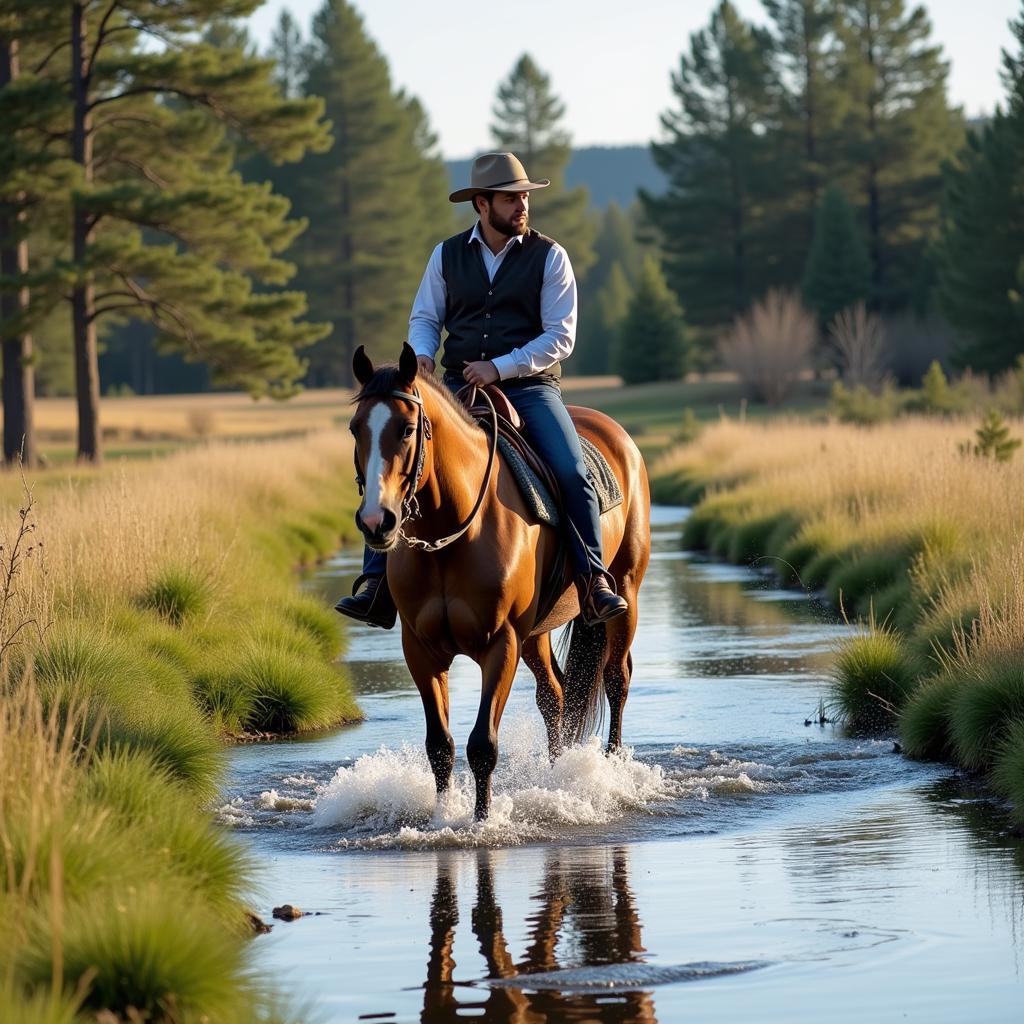Beaver Ranch Horses are a vital part of the working landscape in many parts of the United States, particularly in areas where beavers are prevalent. These horses need to be surefooted, intelligent, and possess a calm temperament to navigate the challenging terrain often associated with beaver habitats. Understanding the unique requirements of beaver ranch horses is key to their well-being and effectiveness on the ranch.
The Unique Role of Beaver Ranch Horses
Beaver ranch horses play a crucial role in managing and maintaining beaver populations, as well as the impact beavers have on the surrounding environment. These horses often work in wet, marshy, and densely wooded areas, requiring them to possess specific traits that allow them to thrive in these conditions. A good beaver ranch horse is not just a mode of transportation; it’s a trusted partner. They are invaluable for tasks like checking beaver dams, herding cattle away from flooded areas, and transporting supplies across difficult terrain.
The terrain these horses navigate can be treacherous, with muddy bogs, fallen trees, and fast-flowing streams. Therefore, a beaver ranch horse must be agile and surefooted, able to traverse uneven ground with confidence. Their calm demeanor is equally important, as they often encounter wildlife and unpredictable situations. A spooked horse in these environments could lead to injury for both horse and rider.
Essential Qualities of a Beaver Ranch Horse
Several key qualities make a horse well-suited for beaver ranch work. Beyond the physical attributes of strength and stamina, these horses must possess a certain mental fortitude. Intelligence, trainability, and a calm temperament are crucial for navigating the often-challenging environments they encounter. Let’s explore these qualities in more detail:
- Surefootedness: Essential for navigating uneven and slippery terrain.
- Stamina: Required for long days working in challenging conditions.
- Calm Temperament: Important for handling unexpected encounters with wildlife.
- Intelligence and Trainability: Allows them to learn and adapt to various tasks.
“A good beaver ranch horse is worth its weight in gold,” says seasoned rancher, Johnathan “Jack” O’Malley, owner of the sprawling O’Malley Ranch in Montana. “They’re not just transportation; they’re partners in managing the land.”
Training and Care for Beaver Ranch Horses
Proper training and care are paramount for the health and longevity of a beaver ranch horse. Building a strong foundation of basic horsemanship is essential before introducing the specialized skills required for working around beavers and their habitats. Desensitization to water, loud noises, and unfamiliar objects is a critical part of their training.
Building Trust and Confidence
Building trust and confidence between horse and rider is essential, especially in the potentially hazardous environments they work in. This involves consistent handling, clear communication, and positive reinforcement. Patience and understanding are key to developing a strong partnership.
 Training a Beaver Ranch Horse to Cross Water
Training a Beaver Ranch Horse to Cross Water
Regular hoof care is also vital due to the wet conditions they frequently encounter. Thrush, a common hoof ailment, can become a serious problem if not addressed promptly. Regular cleaning and application of preventative treatments are essential for maintaining healthy hooves.
“You need a horse that’s not just physically capable, but mentally resilient,” adds Sarah McMillan, an equine veterinarian specializing in working horses. “The environment can be stressful, so a calm and adaptable horse is crucial.”
Understanding Beaver Behavior and its Impact on Ranch Management
Understanding beaver behavior is fundamental to effectively managing their impact on a ranch. Beavers are ecosystem engineers, meaning they significantly alter their environment. While their dams can create beneficial wetlands, they can also cause flooding that damages property and disrupts agricultural practices. Beaver ranch horses enable ranchers to access these areas for dam maintenance and other management strategies.
Balancing the Ecosystem
The goal isn’t to eradicate beavers but to manage their populations and mitigate any negative impacts on the ranch. Beaver ranch horses allow for regular monitoring of beaver activity and facilitate necessary interventions. This may involve installing flow devices in dams to control water levels or removing dams that pose a significant threat.
Conclusion
Beaver ranch horses are indispensable partners for ranchers working in beaver-rich environments. Their unique combination of physical and mental attributes, coupled with specialized training, allows them to navigate challenging terrain and assist in managing beaver populations effectively. By understanding the specific needs and care requirements of these remarkable animals, we can ensure their well-being and continued contribution to the working landscape. Beaver ranch horses are a testament to the powerful bond between humans and animals, and their importance in balancing the needs of both the ranch and the ecosystem.
FAQ
- What breeds are best suited for beaver ranch work?
- How do you train a horse to be comfortable in water?
- What are the common health concerns for beaver ranch horses?
- How do you manage beaver populations without harming them?
- What equipment is necessary for working with beaver ranch horses?
- How can I find a reputable breeder of beaver ranch horses?
- What are the long-term costs associated with owning a beaver ranch horse?
Need help with your beaver ranch horses or other equine needs? Contact Justus Horses USA at Phone: 0772127271, Email: [email protected] or visit us at QGM2+WX2, Vị Trung, Vị Thuỷ, Hậu Giang, Việt Nam. We have a 24/7 customer service team ready to assist you.